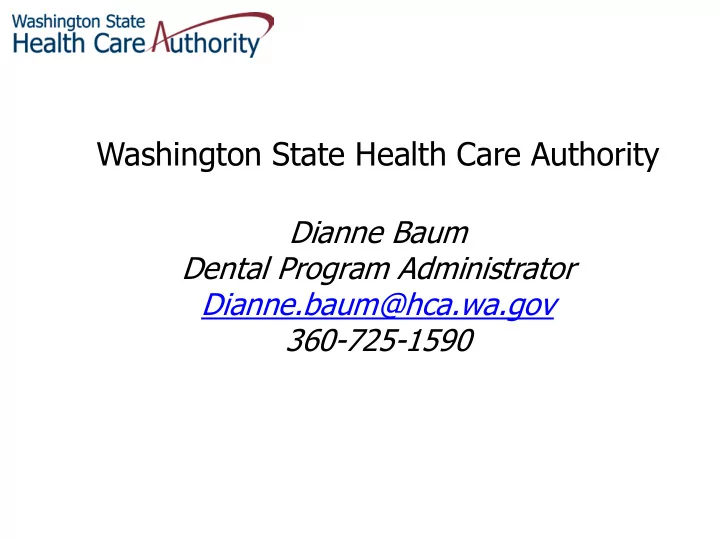

Washington State Health Care Authority Dianne Baum Dental Program Administrator Dianne.baum@hca.wa.gov 360-725-1590
DENTAL COVERAGE A. Dental services are currently provided through the Fee for Service payment method. The Health Care Authority manages the dental benefit and pays enrolled providers. B. Dental coverage has been available since at least 1985 when I started in the authorization area. C. Children’s dental (ages 0 -20) is a federal requirement. D. Adult dental is what is known as an “optional program” and was eliminated in 2011 with the exception of clients who were on a COPES waiver, resided in a skilled nursing facility or were pregnant. The program was reinstated in January of 2014. E. Children’s benefits are more robust than those for Adults, for example crowns and root canals on all teeth are covered for children, but crowns are not covered for adults and only root canals on anterior teeth.
FACTS and DATA • In FY 2013, the vast majority of spending (93%) was on services for children, as budget cuts largely eliminated the adult dental program as of January 2011. • Diagnostic and preventive services were the types of services most frequently used, but restorative services contributed to the largest proportion of total expenditures. • In FY 2014, the adult dental program was reinstated. • In FY 2015, 55.5% of children enrolled received a dental services, compared to 22.4% of adults. • In FY15 expenditures for adults was $111,625,550 as compared to children $227,585,642. • In FY15 the eligible adult population is 1,047,414 as compared to children 956,224.
Dental Providers Treating Apple Health Clients • There are currently 3768 enrolled dental providers – General dentists = 3,541 – Pediatric Dentists = 30 – Oral Surgeons = 87 – Orthodontist = 110 There are currently 1067 taking new Apple Health clients – General dentists = 855 – Pediatric Dentist = 39 – Oral Surgeons = 44 – Orthodontist = 111 4
Audits • Why? HCA manages billions in state & federal Medicaid dollars, providing healthcare to over 1.5 million people in Washington: Washington’s Medicaid Agency (HCA) is mandated to conduct audits - both by federal law and by Washington’s Legislature Many federal oversight and cost-recovery acts have established additional compliance obligations (including Deficit Reduction Act of 2005 & Affordable Care Act) Among those Audited by HCA: Hospitals, Medical Providers (DME, physicians, ambulance services, behavioral health, chemical dependency, orthotics, pain management), denturists and Dentists
Audits • Who? HCA & Other state and federal agencies may show up: • The State Auditor’s Office , usually to examine dental providers to assess how HCA is managing the Medicaid dental program. • Labor & Industries may assess quality of care for injured workers. • The Department of Health can review, audit, and/or suspend licenses. • The Department of Revenue may want to audit a provider’s taxes • Medicaid Fraud Control may visit to investigate allegations received • Federal Health & Human Services / Office of the Inspector General may request records to assess State management of the Medicaid dental program HCA does not authorize nor control the activities of these other agencies
Audits • What’s the likelihood of being audited? From 2009-2014, fewer than ½ of 1% of all Washington Medicaid dental providers (16 total) have been audited. • HCA itself does not conduct audits of dental providers • HCA dental provider audits are performed by HMS, the MIC Contractor under contract to the federal government HCA does run algorithms that identify claim-specific overpayments in all programs. They are not considered audits. • algorithms are data-driven • they are not provider-focused
Audits • What are the most common findings? Unbundling of Procedures. 1. Billing a global procedure as multiple component parts, resulting in additional revenue 2. Upcoding Billing a higher cost procedure than the one performed Example: Chart indicates no complications but higher level is billed 3. Exceeding Program Limits : Example: Billing more oral evaluations than allowable in a year Example: Billing additional evaluations for siblings on the same day
Audits • What are the most common findings? 4. Uncovered Services Service not covered but billed using covered service code Example: Service not performed by a licensed dental hygienist 5. Insufficient Documentation No documentation of the procedure Nothing in the chart to support the specific services billed This is the most common of all findings during dental audits. Think like an auditor. Always remember: “ If it’s not documented, IT DIDN’T HAPPEN !”
Audits • Suggestions 1. Know how the CDT defines the code 2. Follow documentation guidelines in WAC and Provider Guides 3. Document only what’s performed, bill only what’s documented 4. As a practice, keep current with any changes to coverage 5. Remember: “ If it’s not documented, it didn’t happen .”
Helpful Information • Billing guides are updated quarterly, January, April, July and October. • Sign up for go-delivery e-mails • Review fact sheets: http://www.hca.wa.gov/medicaid/provider/Pages/factsheets.aspx • If you need a prior authorization expedited or are having severe billing problems or want to attend one of our Dental Provider One trainings, you can send an e-mail to dentalprovhelp@hca.wa.gov for assistance. • Dental webpage: http://www.hca.wa.gov/medicaid/dentalproviders/Pages/index.asp x
Recommend
More recommend